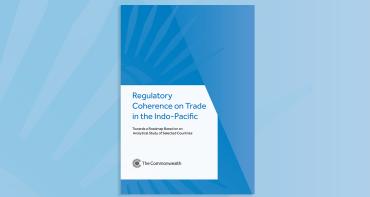Outcomes Document
- Commonwealth Heads of Government, at their meeting in Port of Spain in 2009, recognised that levels of public and private financial resources for developing countries to address the challenges of climate change needed to be scaled up urgently and substantially. They further recognised that member states are entering a more intense phase of work at the national level to prepare their economies and societies for climate change, emphasising the need for support to small states and least developed countries in advancing their own strategies and policy frameworks on adaptation and towards carbon-neutral and climate-resilient economies.
- In response to these mandates, a High-Level Commonwealth Meeting on Climate Finance was convened at Wiston House in the UK from 23-25 January 2011. This brought together a regionally-representative group from Commonwealth Ministries of Planning, Finance, Environment and Foreign Affairs, as well as development partners, experts on climate finance and regional organisations, to focus on the climate finance needs of the Commonwealth’s poorest and most vulnerable members, especially Small Island Developing States (SIDS), low lying coastal states, Least Developed Countries (LDCs) and other African members.
- The meeting drew on the experiences of member states and experts to explore the effectiveness of current disbursement mechanisms and options for improving existing arrangements. Participants noted that climate change is a developmental challenge that requires an all-sector approach and considered opportunities for strengthening national development planning to take account of climate change.
- Discussions uncovered a broad range of concerns regarding the current effectiveness of climate financing. Participants noted the inadequate level of accessible climate finance for their adaptation and mitigation needs; difficulties in accessing existing sources of funding; the imbalance between the financing of mitigation and adaptation actions; the challenge of fragmented funding sources; and the need for climate financing to be driven more strongly by national programmes and needs.
- Participants noted that a lack of capitalisation of the LDC Fund had posed particular difficulties for the implementation of National Adaptation Programmes of Action (NAPAs). They highlighted that bilateral assistance had, in many instances, been more effective than multilateral approaches in providing tailored assistance. Participants emphasised the need to learn lessons from positive experiences and constraints in the current climate finance architecture, as well as from the dialogue on Aid Effectiveness, so as to inform the design of new multilateral arrangements, including the Green Fund.
- Since vulnerability to climate change is both a product of exposure to climate risks and the capacity to address those risks, the meeting discussed capacity constraints in securing, absorbing and managing climate finance. Participants recognised these capacity constraints were a key consideration in the design of frameworks that support access to, and use of, climate finance by highly vulnerable Commonwealth member states.
- Participants emphasised that the reach of the Commonwealth across all key negotiating groups and its status as a trusted partner with its membership gave it an important role in addressing climate finance concerns. The meeting considered a series of practical collaborative steps that can be taken by the Commonwealth, in conjunction with other partners, to help facilitate a more rapid and scaled-up flow of financing to the Commonwealth’s most vulnerable members.
a) Options and Experiences with Financing Mechanisms
Participants recommended a series of steps to share members’ experiences with different climate finance mechanisms. A specific project could be implemented through studies, seminars and on‑line facilities, such as the Commonwealth’s online portal, CP3. Participants suggested three areas of immediate focus for collaboration:
i. Current issues in climate financing for highly vulnerable member states:
- Achieving a better balance in allocation of climate finance between countries;
- Improving upon the present understanding of climate financing needs;
- Addressing the limited mitigation opportunities in many SIDS, LDCs and African countries, with a view to realising development dividends;
- Sharing detailed and practical experiences with the use of multilateral and bilateral climate finance in vulnerable member states;
- Examining the relative advantages of various modes of climate finance delivery and application/disbursement issues and drawing out lessons from this experience;
- Identifying and better understanding concerns over national capacities and the fragmentation of finance delivery, as well as practical solutions to resolve these;
- Examining the potential for further practical approaches to promote programmatic and/or regional responses to support capacity constrained countries, including project design, development, implementation and monitoring.
ii. Helping to strengthen sector climate finance and investment:
- Examining the opportunities and modalities for private sector participation and the role that private sector finance can play in the most vulnerable countries.
- Strengthening the understanding of blended resources; and sharing detailed and practical experiences on blending of resources, including both public and private resources, to achieve climate and development objectives.
- Examining government and public policy frameworks to support the private sector in achieving climate and development objectives.
iii. Building awareness of the scale and breadth of the international response to climate finance:
- Expanding and broadening the currently limited information on how existing climate finance is supporting action at the national level.
- Establishing a summary of national actions by Commonwealth members which are underway and to help to create a more positive narrative around the progress that is being made, through periodic reporting and updates.
b) Strengthening Climate Finance Planning
Participants encouraged the review of the underfunding of completed National Adaptation Programmes of Action (NAPAs), National Communications and other relevant plans of member states. This would be with a view to understanding why full funding had not been secured; and to help identify the necessary funding to complete actions under these plans. The experiences and conclusions drawn from this process will be captured and disseminated more widely.
The Commonwealth should offer technical expertise to strengthen national capacities for priority setting, as well as the national climate change strategies and action plans that are currently being prepared. The meeting recommended that these actions be developed in consultation with other relevant institutions and partners.
c) Aligning Climate Finance and National Sustainable Development Plans
Participants discussed the need for a better understanding of the meaning and scope of climate finance and the opportunities presented by it; and they noted the pressing need to align climate finance with national sustainable development frameworks through practical, carefully sequenced and structured steps. Determining the design of programmatic support for climate finance is an urgent, yet un-met, task which the Commonwealth would be well placed to address.
They recognised that climate finance spending should be incorporated in national budgets and be subject to the full rigours of national accountability and effective public expenditure management. This will require a further strengthening of national monitoring systems, which the Commonwealth could support.
Participants agreed that mutual Commonwealth support could be provided in, where appropriate, the development of national implementing entities as a vehicle to secure direct access from international funds.
They also recommended that a pilot project would be established to explore the value to national governments of, and practical approaches to ensuring the coherence of international investments in national development strategies from a range of sources, including climate finance.
d) Institutional Development
Participants discussed institutional constraints to effective use of climate finance and noted the need for knowledge of practical solutions and best practices to be shared across the Commonwealth. Areas for action include technical support and exchanges to help vulnerable countries with accreditation of National Implementing Entities; and an initiative to clarify the climate financing architecture to ministries of planning and finance. They also suggested the Commonwealth Secretariat develop a practical workbook on institution building. This would draw on generic analytical work and a series of case studies to draw out lessons learned on key drivers in un-locking climate finance, examining aspects such as the expertise used; skill requirements; the role of national and regional institutions; the role of legislation; and communications. This activity could be progressed in consultation with relevant partners.
e) Approaches at the Regional Level
Participants recognised the role of regional organisations and regional development banks in sharing best practice, pooling expertise and facilitating access to climate finance by member states. It was recommended that a conference should be convened to explore how to help strengthen regional organisations and regional development banks in:
- becoming implementing agencies and facilitating improved access to climate finance;
- preparing rosters of projects ready for funding;
- elaborating their respective roles;
- sharing best practice in regional approaches across different regions.
The conference could also explore the development of nationally appropriate mitigation actions and share experience on design lessons from existing funding mechanisms. The meeting encouraged the development of this practical initiative in consultation with regional organisations in the Pacific, Caribbean, Indian Ocean and Africa, as well as Development Banks, other development partners and La Francophonie.
Immediate Next Steps
- To elaborate Commonwealth mutual support the meeting recommended that the following steps need to be taken:
- The establishment of a working group to help take forward the range of recommended initiatives;
- Integration of work on climate finance in the Commonwealth Secretariat’s 2012-2016 Strategic Plan;
- Active fostering of support for the work plan by member states; and collaborating institutions, including financial and technical support
- A report to Commonwealth Heads of Government at the 2011 CHOGM in Perth on progress made, and challenges faced, including the need for enhanced funding for Commonwealth work on climate finance.
Participants recommended the consideration and endorsement of these recommendations by the Commonwealth Consultative Group on the Environment at its next meeting.
Wiston House, January 2011



